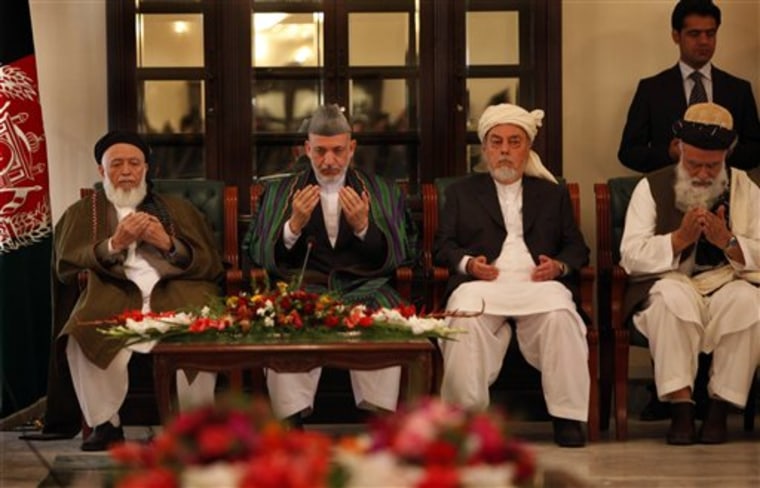Releasing Taliban figures detained at Guantanamo Bay and scratching scores of others off the U.N. sanctions list would jump-start peace talks aimed at ending the 9-year-old war, members of Afghanistan's new peace council said Tuesday.
The council members, who hold their first business meeting on Wednesday, said goodwill gestures from the U.S. and international community could spur reconciliation talks — perhaps at a neutral location in Saudi Arabia, Turkmenistan, Egypt or Turkey.
The momentum for a political solution has been slowly building in Afghanistan as public support for the war has waned in the West. The renewed push for peace comes as the last of 30,000 U.S. reinforcements have arrived in Afghanistan, pushing deeper into areas long held by insurgents.
Many top military and diplomatic leaders have publicly supported peace efforts, though they remain skeptical that insurgents are ready to lay down their arms, embrace the Afghan constitution and sever ties with al-Qaida and other terrorist networks.
'Countryman to countryman'
Ethnic minorities and women, who were repressed under the Taliban, have expressed concerns about what any deal with the militants would bring. Most members of the Taliban are Pashtuns, the largest ethnic group in Afghanistan. The minority Tajiks, Uzbeks and Hazaras are not likely to sit quietly on the sidelines if Karzai, a Pashtun, makes a deal with insurgents.
But Staffan de Mistura, the top U.N. envoy in Afghanistan, said all parties including the Taliban know there is no military solution to the conflict. He predicted the next several months will be particularly violent because both the Taliban and international forces will be applying maximum pressure on each other to position themselves for possible negotiation.
In hopes of finding a peaceful resolution, Afghan President Hamid Karzai recently set up the 68-member council to guide formal talks with the armed opposition.
Karzai said this week that his government has been talking with the Taliban "countryman to countryman" for "quite some time." He characterized the talks as unofficial personal contacts — not official contact with the Taliban leadership.
"That hasn't happened yet and we hope we can begin that as soon as possible," Karzai said.
Arsala Rahmani, a member of the peace council who served as deputy education minister in the former Taliban regime, said Tuesday that discussions were under way for the United States or United Nations to guarantee safe passage for representatives of militant groups to meet somewhere outside of Afghanistan, Pakistan and Iran to discuss ways to reconcile with the Afghan government. Rahmani, who insisted he was not speaking on behalf of the entire council, said neutral meeting sites under discussion were in Saudi Arabia, Turkey, Turkmenistan and Egypt.
Rahmani said trust must be established between the Taliban and the U.S. and other Western players. Release of four or five top Taliban prisoners from the U.S. detention center at Guantanamo Bay and the de-listing of about 150 individuals linked to the Taliban from the U.N. sanctions list are the key stumbling blocks to negotiating peace, he said.
A second member of the peace council, who spoke on condition of anonymity because of the sensitivity of the issue, said the Taliban will show more flexibility if such measures are taken.
"When that trust can be established, the political process can move forward," Rahmani said.
Publicly, the Taliban have rejected the peace council, calling it an "American initiative to delay the withdrawal of foreign troops from Afghanistan."
In Washington, State Department spokesman P.J. Crowley said the U.S. was considering modifications to the U.N. sanctions list, but that the matter of releasing prisoners from Guantanamo Bay was unrelated to the Afghan peace process.
"On an ongoing basis we are evaluating modifications to the individuals on the sanctions list at the U.N.," Crowley said Tuesday. "We've made some adjustments during the course of this year. And as we work through issues and, you know, in collaboration with the U.N. and other members of the U.N. Security Council, that is certainly possible."
Rahmani and the other member of the peace council also said Pakistan should release or give Afghanistan custody of its Afghan prisoners, including the Afghan Taliban's No. 2 leader, Mullah Abdul Ghani Baradar. Baradar was arrested in February in a joint raid with the CIA — a move some analysts believe was driven by Pakistan's desire to guarantee itself a seat at the negotiating table. Rahmani said Baradar was one of 31 Afghan Taliban figures being held in Pakistan because they were willing to talk peace.
"We don't know where they are, whether in prison in Pakistan, or maybe living comfortable in guest houses," he said.
Pakistani Prime Minister Yousuf Raza Gilani tried to dispel concerns about his country's role when asked about Taliban peace talks Tuesday, but also reminded observers of the leverage Pakistan has in the process.
"Look, nothing can happen without us because we are part of the solution. We are not part of the problem," Gilani said.
___
Associated Press writers Robert Burns in Washington and Kathy Gannon and Zarar Khan in Islamabad contributed to this report.
